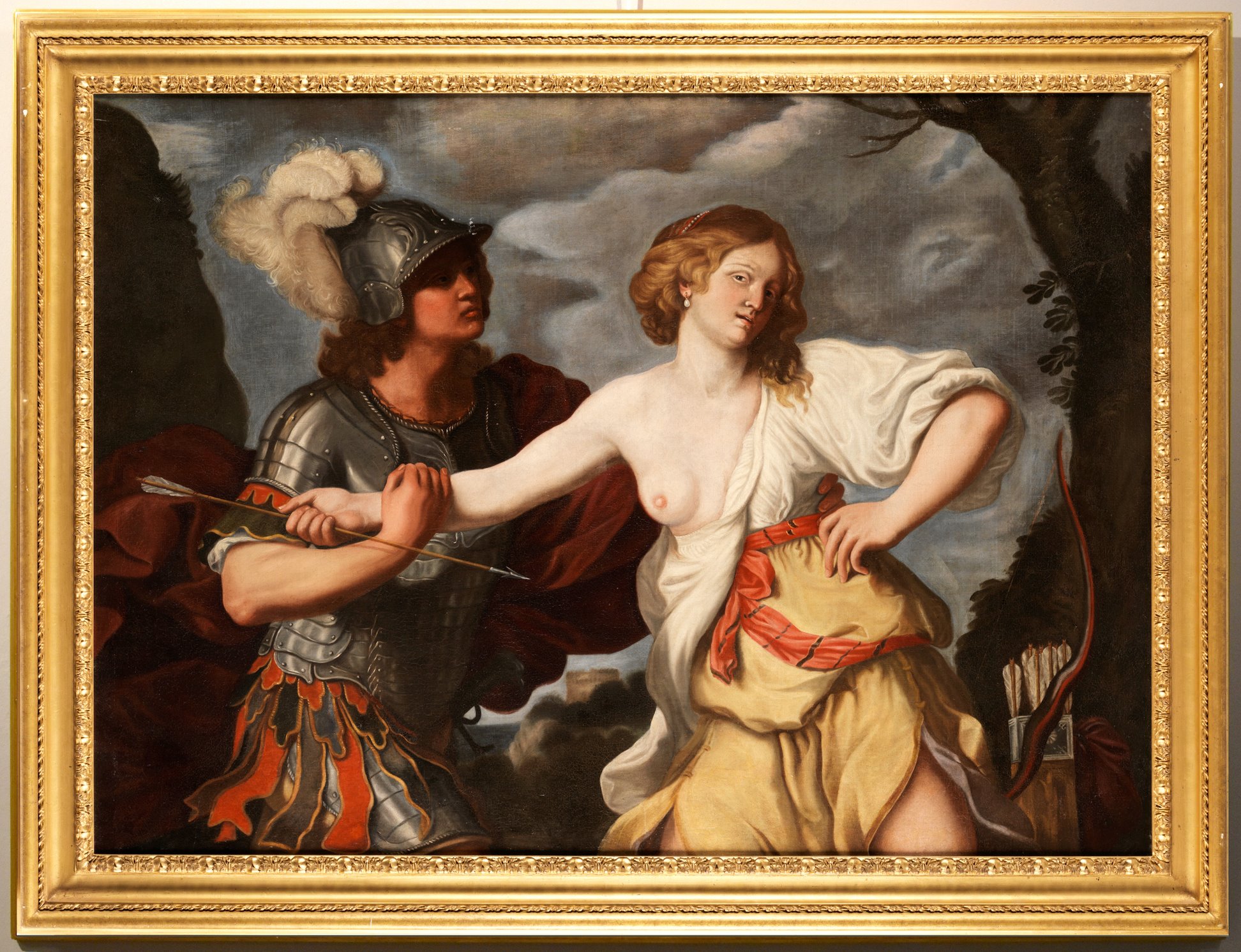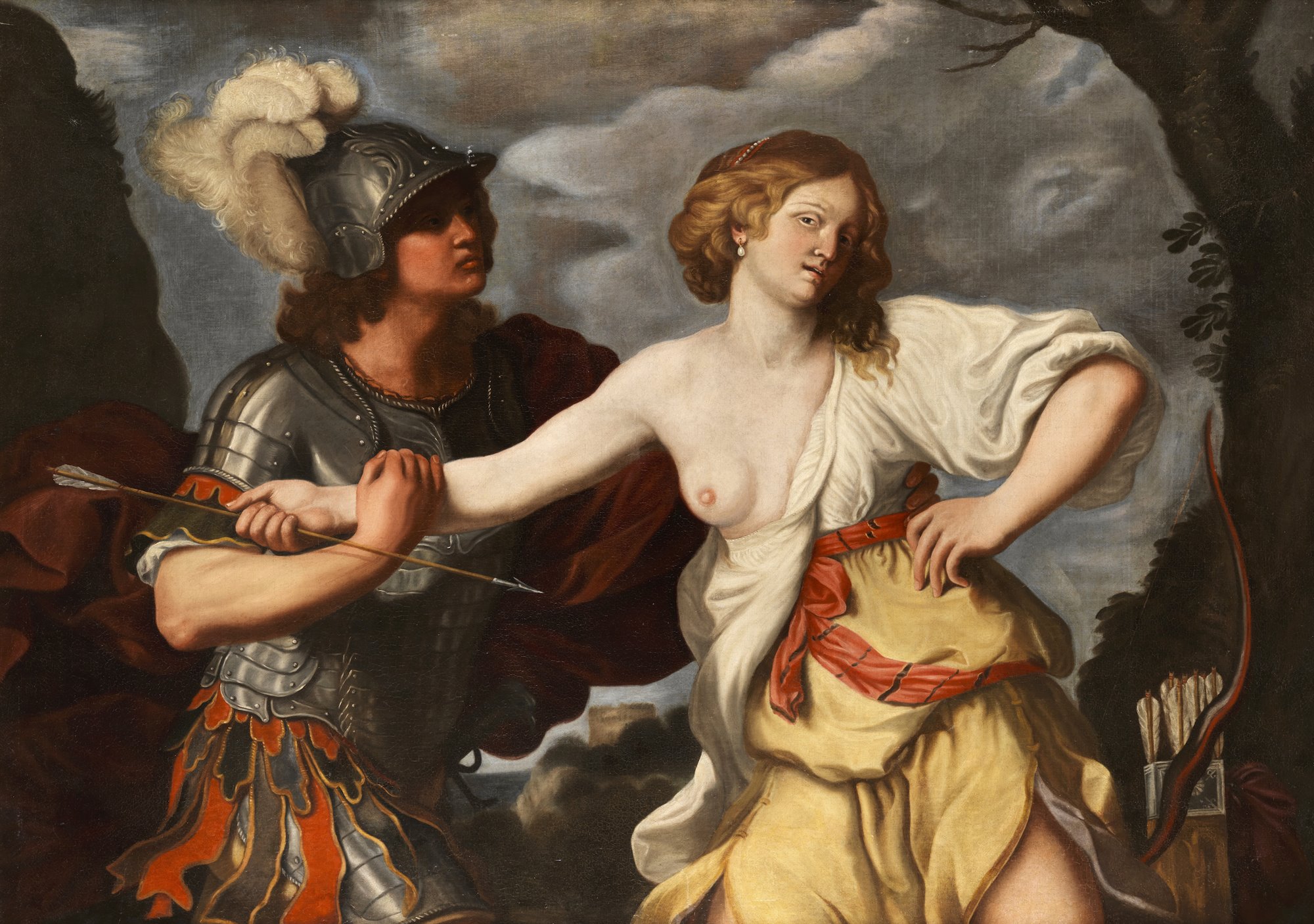Cesare Gennari (Cento, 1637 - Bologna, 1688)
Rinaldo trattiene Armida
Cesare Gennari
(Cento, 1637 - Bologna, 1688)
- Guercino workshop -
(Cento, 1637 - Bologna, 1688)
- Guercino workshop -
Rinaldo holds Armida
Oil on canvas, 119 x 164 cm.
In frame 141 x 189 cm.
The work is accompanied by a critical study written by prof. Emilio Negro (Bologna)
This valuable work can be ascribed to the production of Cesare Gennari (Cento, 1637 - Bologna, 1688), and depicts the episode of the last canto of the heroic poem the 'Gerusalemme Liberata' by Torquato Tasso, which features the two famous lovers Rinaldo and Armida, one a knight of the Christian army, the other a young and beautiful sorceress sent to help the Saracens.
The episode focuses on the terrible battle between the Crusaders and the Egyptian army, during which Rinaldo and Armida challenge each other to a duel. The sorceress, after having tried in vain to hit the young warrior with whom she is still madly in love, taken by despair decides to kill herself with the same arrow used for the fight, but her desperate gesture is prevented by the prompt intervention of the hero.
First of all, it should be noted that the painting is an interesting replica with variants derived from a Guercinesque invention (another varied version attributed to Benedetto Gennari of a smaller size [oil on canvas 110 x 42 cm], is in the Chamber of Deputies in Rome but in storage from Naples, from the Museum and Real Bosco di Capodimonte), of which he only takes up the general layout and style of the works created by the great Cento master, generally with the help of his valid collaborators.
So our canvas shows its evident belonging to the narrow sphere of this great seventeenth-century Emilian master: in fact, its author manages to give the composition an absolutely singular solar luminosity that illuminates the features of the serene faces and illusory illusory accentuates the softness of the complexions, of the hair and tissue. These effective contrasts of light, obtained with warm tones and a rich and pasty pictorial mixture, give the painting examined here a typically Guercinesque-like pleasantness.
For these unavoidable reasons, it is possible to link him to the modus pingendi of one of the most talented pupils of the master centesimi, as well as his nephew: Cesare Gennari (Cento, 1637 - Bologna, 1688), rightly considered one of the best talents born from the prestigious teaching of master.
Son of Lucia, sister of Guercino, and of Ercole Gennari, also his collaborator, Cesare was introduced as a child in the shop of his uncle together with his brother Benedetto; both became esteemed painters and hereditary all possessions and the studio of painting the death of the master. If Benedict decided to move abroad, to the courts of Paris and London, where he spent most of his life, Cesare instead remained permanently in Bologna, where he was very active and appreciated for the great purity of his vigorous naturalistic painting. : characteristics that are also punctually found in our canvas.
This Rinaldo who holds Armida in fact notes the independent typological characters, albeit in close connection with the culture of Guercino, which are the usual ones Cesare Gennari: the comparison with his other works allows in fact to recognize the typical qualities, in addition to declaring decidedly individual extremes that they are found, almost superimposable, in other similar paintings of his.
As is evident, in the two works mentioned, the same characters of our painting return, that is a type of flowing and soft painting that recalls that of Guercino but with very personalized features, characteristic of the best works created by Cesare Gennari in the years of his full artistic maturity. .
The painting is completed with an elegant gilt frame.
For any information, please contact us.




